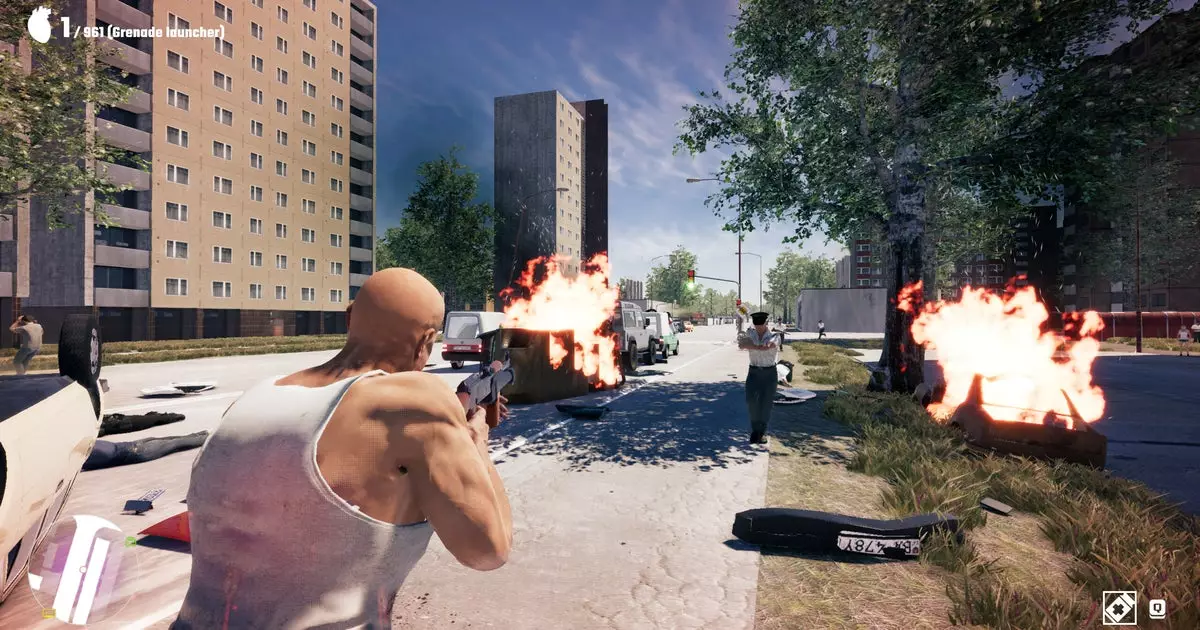In the crowded realm of open-world gaming, where titles often vie for the crown of innovation, Vivat Slovakia emerges as a daring endeavor. Attempting to capture the essence of a bygone era teetering between nostalgia and controversy, this game brings players to 1990s Slovakia, a time fraught with corruption and societal upheaval. However, despite its ambition, it does not quite fulfill the lofty expectations of being the potential successor to the monumental Grand Theft Auto (GTA) franchise. While the developers deserve kudos for their creativity, it becomes painfully evident that Vivat Slovakia needs more polish and depth to compete with the heavyweights in the genre.
Vivat Slovakia bills itself as an open-world action game where players step into the shoes of Trotter, an unlikeable taxi driver who moonlights as an undercover cop. At first glance, this premise bears a striking resemblance to the captivating narrative frameworks established by the GTA series. Nonetheless, what quickly becomes apparent is that this game feels more like a tribute rather than a worthy challenger. The game’s early access build titled ‘Side A’ introduces players to an array of mechanics that, while intriguing, occasionally fall flat. For example, the launching sequence includes driving passengers around, during which Trotter engages in questionable conversations that aim to depict the social climate of the time—yet they come off as forced and somewhat cringeworthy.
The developers seem to be aware of their shortcomings, as evidenced by the inclusion of five radio stations to entertain the player during drives. This feature emits a sense of nostalgia, reminding gamers of the iconic radio broadcasts that enriched the GTA experience. Yet, when digging deeper, the execution feels hollow. The music selections do not seem to integrate well with the game’s ambience, often pulling players out of the immersive environment they seek to engage with.
Trotter himself can be viewed as a narrative device fraught with contradiction. On one hand, his rough demeanor and unlikability are designed to reflect the gritty landscape of 1990s Slovakia. However, these traits make players less invested in his journey, and the dialogue falls short of the mark. The recent addition of English voice acting aimed at enhancing the experience comes off as an ambitious, yet misguided decision. The performances often lack the depth needed to bring the story and characters to life, becoming distractions rather than enhancements.
Furthermore, the game is riddled with uncomfortable moments, as witnessed in Trotter’s remark about insinuating a journalist’s profession based solely on a mention of her hotel work. Although meant to portray the moral decay of society, it instead stumbles into territory that can be perceived as outdated or even offensive. This unevenness impedes the narrative’s ability to resonate with a modern audience.
Vivat Slovakia places players in missions that hint at historical accuracy, threading the events of the time with political intrigue and crime syndicates. However, despite these well-intentioned storylines, they often lack true depth. The missions can feel repetitive, often resorting to similar themes due to constrained gameplay mechanics, which dampens the thrill of exploration in an open-world context. For instance, the tutorial involving the use of a sniper rifle against someone fleeing across the border elicits a morbid curiosity—yet it feels like a missed opportunity for richer storytelling.
Moreover, while the interaction with various groups of passengers during taxi rides is intended to create varied dynamics, many of their reactions feel cookie-cutter rather than tailored, lacking the nuance that would make them engaging and memorable.
Ultimately, Vivat Slovakia stands as a daring effort to honor the legacy of Rockstar’s achievements while navigating the complexities of history and morality. However, it is clear that the title, for all its ambitions, falls short of its potential. While the existence of the game is commendable, and while it might enrich the broader conversation surrounding open-world gaming, it is not the groundbreaking experience that many might have hoped for. Instead, it serves as a sober reminder that not every attempt to emulate greatness can achieve it. Players interested in exploring this unique take on the genre may find moments of intrigue, but they should brace for a journey fraught with the imperfections typical of early access titles.


Leave a Reply